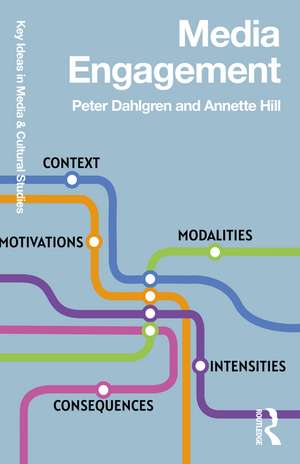Media Engagement: Key Ideas in Media & Cultural Studies
Autor Peter Dahlgren, Annette Hillen Limba Engleză Paperback – 30 sep 2022
This book navigates the reader through a tighter analytical notion of engagement within an understanding of media, culture and democracy. Dahlgren and Hill offer a new definition of engagement as an energising internal force, and as such a powerful means to further human agency. From this definition, the book builds a generative theory of engagement as a nexus of relations we make and break with media on a daily basis, with examples from political activism, news and disinformation, and the global pandemic. Dahlgren and Hill identify five parameters of engagement in order to understand the relations we have with media across changing public and mediated spheres. This new perspective offers students and researchers pathways for investigating the meaning of media engagement as a resource for living.
It will be particularly useful for undergraduate courses on media audiences and publics, political communication and democracy, media and cultural theory, journalism, and for media, communication and sociology studies more broadly.
Din seria Key Ideas in Media & Cultural Studies
-
 Preț: 235.07 lei
Preț: 235.07 lei -
 Preț: 236.28 lei
Preț: 236.28 lei -
 Preț: 236.80 lei
Preț: 236.80 lei -
 Preț: 237.37 lei
Preț: 237.37 lei -
 Preț: 205.44 lei
Preț: 205.44 lei -
 Preț: 138.06 lei
Preț: 138.06 lei -
 Preț: 237.64 lei
Preț: 237.64 lei -
 Preț: 236.33 lei
Preț: 236.33 lei - 24%
 Preț: 180.20 lei
Preț: 180.20 lei -
 Preț: 266.71 lei
Preț: 266.71 lei -
 Preț: 272.92 lei
Preț: 272.92 lei
Preț: 238.43 lei
Nou
Puncte Express: 358
Preț estimativ în valută:
45.62€ • 47.76$ • 37.75£
45.62€ • 47.76$ • 37.75£
Carte disponibilă
Livrare economică 15-29 martie
Livrare express 01-07 martie pentru 25.82 lei
Preluare comenzi: 021 569.72.76
Specificații
ISBN-13: 9781032016610
ISBN-10: 1032016612
Pagini: 198
Ilustrații: 2 Line drawings, black and white; 2 Halftones, black and white; 4 Illustrations, black and white
Dimensiuni: 129 x 198 x 22 mm
Greutate: 0.36 kg
Ediția:1
Editura: Taylor & Francis
Colecția Routledge
Seria Key Ideas in Media & Cultural Studies
Locul publicării:Oxford, United Kingdom
ISBN-10: 1032016612
Pagini: 198
Ilustrații: 2 Line drawings, black and white; 2 Halftones, black and white; 4 Illustrations, black and white
Dimensiuni: 129 x 198 x 22 mm
Greutate: 0.36 kg
Ediția:1
Editura: Taylor & Francis
Colecția Routledge
Seria Key Ideas in Media & Cultural Studies
Locul publicării:Oxford, United Kingdom
Public țintă
Postgraduate and UndergraduateRecenzii
"Democracies depend upon engaged citizens, but what exactly does engagement entail? In this remarkably clear and insightful book, Peter Dahlgren and Annette Hill offer a rich definition of this widely used but commonly under-theorised concept. It will become a point of reference for many years to come."
Stephen Coleman, Professor of Political Communication, University of Leeds, UK
"Media engagement is commodified, analyzed and mythologized, yet rarely is it fully understood. In this insightful book, Dahlgren and Hill explain how people engage with media to make sense of everyday life. In so doing, they tell stories, create myths, experience joy and sorrow, and above all, they survive."
Zizi Papacharissi, Professor of Communication and Political Science, University of Illinois Chicago, USA
Stephen Coleman, Professor of Political Communication, University of Leeds, UK
"Media engagement is commodified, analyzed and mythologized, yet rarely is it fully understood. In this insightful book, Dahlgren and Hill explain how people engage with media to make sense of everyday life. In so doing, they tell stories, create myths, experience joy and sorrow, and above all, they survive."
Zizi Papacharissi, Professor of Communication and Political Science, University of Illinois Chicago, USA
Cuprins
Foreword by John Corner Part I: Mapping Engagement 1. Introduction: Understanding Media Engagement 2. Parameters of Media Engagement Part II: Changing Public Settings for Engagement 3. Vectors of Media and Political Engagement 4. Public Spheres and their Contingencies Part III: Case Studies in Public Knowledge and Political Engagement 5. Audience Engagement: Researching News in Southeast Asia 6. News Relations 7. The Belarus Protests: A Case Study of Political Engagement 8. Conclusion: Contingencies of Media Engagement Appendix: News Engagement Interview Guide
Notă biografică
Peter Dahlgren is Professor Emeritus of Media and Communication at Lund University, Sweden. Along with many works on public spheres, civic cultures and media theory, his recent publications include Media and Political Engagement (2009) and The Political Web (2013).
Annette Hill is Professor of Media and Communication at Lund University, Sweden, and Visiting Professor at King’s College London. Her latest book is The Handbook of Mobile Socialities (with M. Hartmann and M. Andersson) and her next book is Roaming Audiences (2023).
Annette Hill is Professor of Media and Communication at Lund University, Sweden, and Visiting Professor at King’s College London. Her latest book is The Handbook of Mobile Socialities (with M. Hartmann and M. Andersson) and her next book is Roaming Audiences (2023).
Descriere
Written with media students in mind, this accessible book provides both students and researchers with a new perspective on how to research engagement, not as a metric but as a marker of power relations.
